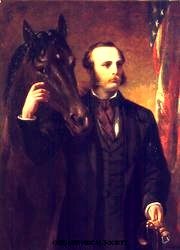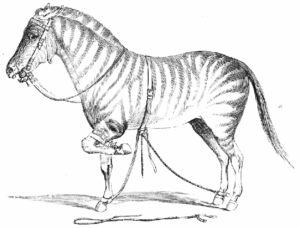- “That [the horse] is so constituted by nature that he will not offer resistance to any demand made of him which he fully comprehends, if made in a way consistent with the laws of his nature.“
- “That he has no consciousness of his strength beyond his experience, and can be handled according to our will without force.“
- “That we can, in compliance with the laws of his nature, by which he examines all things new to him, take any object, however frightful, around, over, or on him, that does not inflict pain — without causing him to fear.“
These principles are clearly related to some concepts already mentioned in Natural Horsemanship: consistency, gentleness, desensitizing. It is quite interesting to read along the book some concepts and ideas that were contemporary to Xenophon more than 2,000 years ago.

 Patience
Patience
John Solomon Rarey emphasizes how patient we should be when dealing with horses, in particular with young colts: “‘haste makes waste’, that is, waste of time — for the gain of trouble and perplexity.”
 Gentleness
Gentleness
The horseman who so brilliantly astonished Europe a century and a half ago and was admired by the Queen of England herself then, insisted on the crucial quality that is to keep his temper: “Fear and anger, a good horseman should never feel.” My only negative criticism of John Rarey has nothing to do with the method that was efficient and kind to horses. He specialized himself in laying down the most difficult animals and explained the process in his book _ not in the first edition yet.

- use ancient knowledge and claim its ownership (“J.S. Rarey‘s Art of Taming Horses“),
- make people pay to learn a bit of the knowledge you acquired.
On the other, it is important to mention that the last edition of this book actually revealed his methods and knowledge in details, as he had too many customers anyway and the word began to spread.
I would like to conclude this article by quoting John Solomon Rarey’s inspiring words:
“The horse, the most beautiful and useful of animals to man, is seldom sufficiently instructed or familiarised, although certainly capable of the greatest attachment to his master when well used, and deserving to be treated more as a friend than a slave.
A New Illustrated Edition of J.S. Rarey’s Art of Taming Horses, John Solomon Rarey

 ENGLISH
ENGLISH DEUTSCH
DEUTSCH ESPAÑOL
ESPAÑOL FRANÇAIS
FRANÇAIS